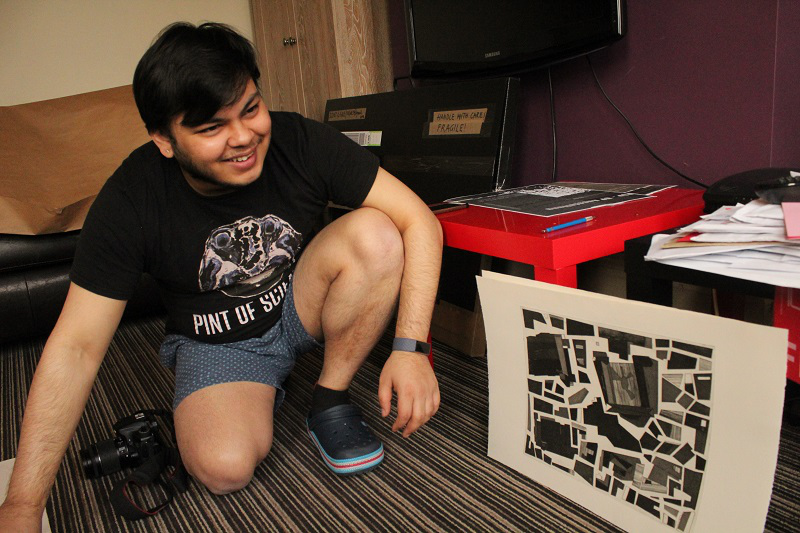“You come here for reason, but that’s not happening”, said Rohit Kale, a NTU master student in Fine Art, in an interview for Platform by Na Qing.
Rohit, 25, spoke about his experience as an Erasmus student in Germany and the challenges that came within.
“I started my study at ABK Stuttgart university last September,” he recalled.
“It took me roughly 30 minutes to get to campus from my accommodation…you can see cars like BMW and Posh everywhere.
“We had seminars where most conversations were done in German but it’s not a big problem. Because with art, you can visualise that.”
By the end of February, universities were closed as Europe became the new epicentre of coronavirus and rest of the semester was cancelled. Rohit spent most of his time in the last month in dorm.
“There’s no online teaching…it was a waste of time”, he added.
“You come here for reason and you pay a lot for living and travelling expenses, but that’s not happening.”
His student visa was due to expire by the end of March, when the six-month Erasmus program completed, and he planned to fly back to the UK on March 28.
The flight was cancelled due to travelling restrictions amid the pandemic. And there was no way to get his visa extended as embassy office in the city was closed.
He finally managed to get it rescheduled to return on March 25.

On his arrival, accommodation was a complete headache for the the 25-year-old Indian lad. He has been contacted by a man on a Facebook group who was looking for a flatmate.
However, it was only when he visited the place that he realised one of tenants in the house was seriously ill and had flu-like symptoms. Out of the fear of contracting the virus, he decided not to stay there. He did not get his £120 deposit returned two weeks after the conversation with that man.
Thanks to the help from the rest of flatmates, he found an accommodation from NTU.
The university agreed to offer him a place to stay for seven days after following the NHS guidance that he should be quarantined for at least one week because he had travel history. And this allowed him to find a long-term accommodation to stay after the quarantine.
But for a final year art student, life is not easy in the current lockdown.
“Most of my coursework is supposed to be done in a studio, not in a bedroom”, said Rohit.
“That narrows my art practices and it shouldn’t be how art works.
“And there could be same impacts on students who heavily rely on university facilities to conduct their work. This would be a major loss for these students.”
Rohit also complained about the fact that he doesn’t have access to enough resources that would benefit his studies.
He said: “Closure of library also makes it hard to continue my research.My subject is also research-based. Most books are not available online.”
He had collected some books during his study in Germany and posted them back to the UK. However, the delivery has been delayed because of reduced flights amid the outbreak.
“I can’t access to these resources as early as I expected. As a result, I have to do my research all over again,” Rohit added.
Online teaching has been ruled over across UK universities due to the nationwide lockdown in the effort to slow the spread of virus. But as an art student, Rohit said “it is weird that art has been moved online”.
Technology capacity has always been a huge concern for many art students.

“There are lots of materials like photographs that are large in size to be uploaded and there are technical limitations on that”, Rohit added.
He also expressed concerns that students might not be able to perform to the best of their abilities through online presentations, especially in the art practice.
“For example, some may have a relative old laptop which only enables a lower resolution that is not compatible to those on others’ devices. As a result, there are losses of colours and other elements on our online presentation.
“The interpretation might be changed as well depending on the device one’s looking from.”
Internet quality also causes anxiety during online presentation. Rohit told that he lost last 10 minutes in his mid-term review presentation due to internet disruption.
“In art, every time when you present, people might change their views. So, you can actually make a last-minute change to get a good grade.”
Asked if he is worried about his coming graduation ceremony, the final-year said, “What worries me the most as an international student, rather than whether or not being able to have a graduation ceremony as expected, it is the physical resources that I can access from the university that matters the most.
“Not getting educated in the way as expected would be a big loss for many students”, he added.
Nottingham Trent University (NTU) has been contacted to give a comment about this issue.
By Na Qing
Feature photo credit: Na Qing

